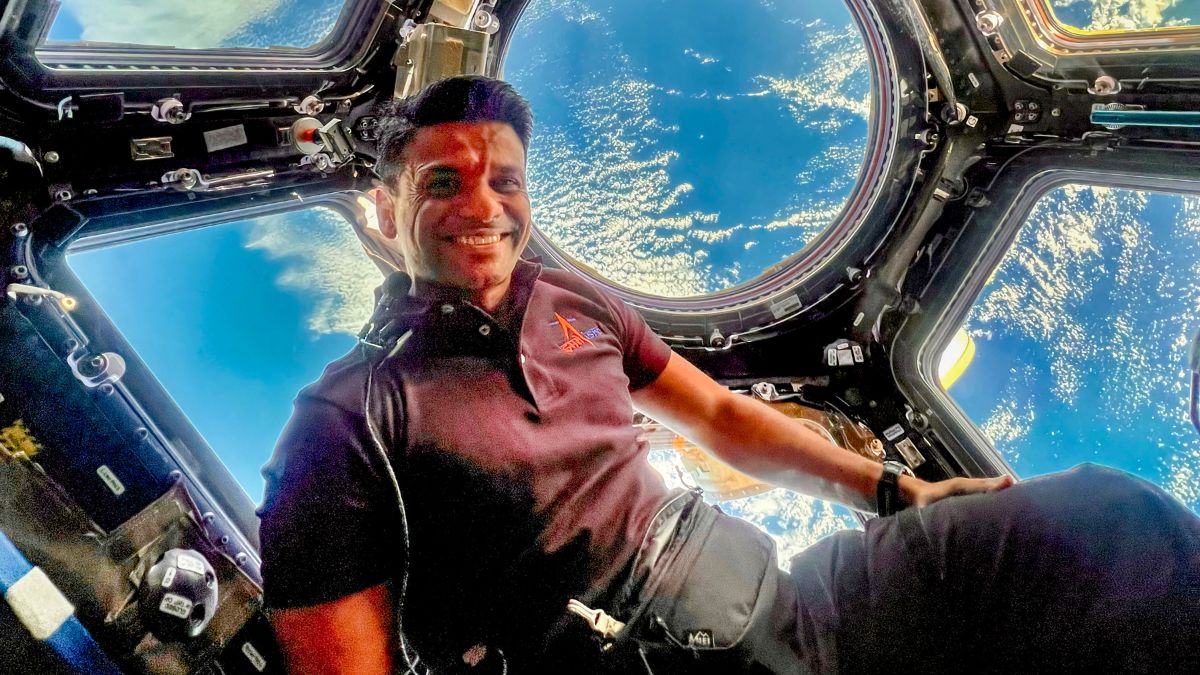Beyond the orbit: Shubhanshu Shukla’s final frontier of discovery on the ISS
 Indian astronaut Group Captain Shubhanshu Shukla aboard the International Space Station | Axiom Space
Indian astronaut Group Captain Shubhanshu Shukla aboard the International Space Station | Axiom Space
As India’s trailblazing astronaut, Shubhanshu Shukla, affectionately known as “Shux,” nears the completion of his historic 14-day mission aboard the International Space Station (ISS), the focus intensifies on the invaluable scientific work conducted during the last leg of this groundbreaking journey.
Having spent two weeks immersed in the unique environment of microgravity, Shukla and his Axiom Mission 4 (Ax-4) crew have meticulously pursued experiments designed to unlock secrets critical for humanity’s future in space and on Earth.
Shukla’s work has been a testament to India’s renewed commitment to space exploration, with several Indian Space Research Organisation (ISRO)-led experiments at the forefront.
As the “Grace” spacecraft prepares for its highly anticipated return, the data collected will provide crucial insights across diverse fields, from human health in space to sustainable extraterrestrial living.
One of the most pressing concerns for astronauts on long-duration missions is the impact of microgravity on the human body. Shukla has been diligently involved in the Myogenesis investigation, studying the rapid muscle loss, or atrophy, experienced in space.
Utilising the specialised Life Sciences Glovebox, he has been examining muscle cells and testing potential countermeasures. This research is not merely for astronauts; its findings hold immense promise for combating muscle-wasting conditions on Earth, such as those affecting the elderly or individuals with prolonged immobility. The mission’s last days will likely see final observations and sample preparations for this critical study.
“Complementing the muscle research, Shukla has also contributed to the bone on ISS experiment, investigating how bone density deteriorates in microgravity and how recovery occurs upon returning to Earth. By analysing biological markers related to bone formation and inflammation, researchers aim to create a “digital twin” of an astronaut’s bones, allowing for personalised risk assessment and tailored countermeasures. This could revolutionise astronaut health screening and lead to better treatments for osteoporosis and other bone-related ailments on our planet,” explained space expert Girish Linganna.
A vital aspect of future deep-space missions is understanding and mitigating the effects of space radiation. Lacking Earth’s protective atmospheric shield, astronauts are exposed to higher levels of radiation. Shukla has been actively involved in monitoring radiation levels aboard the ISS using devices like the Rad Nano Dosimeter. The continuous data collected will be instrumental in developing more effective shielding technologies and safety protocols for missions venturing beyond low Earth orbit, including India’s ambitious Gaganyaan program.
“Beyond human physiology, Shukla’s work has also been pivotal in paving the way for sustainable life support systems in space. He has meticulously tended to various plant experiments, contributing to the burgeoning field of space farming. His observations on the growth patterns of seeds from six different plant varieties, along with nurturing sprouts and microgreens, are crucial for developing reliable food sources for future Moon and Mars missions. In the final phase of the mission, these plant samples will be carefully prepared for their journey back to Earth, where they will be analysed for genetic, microbial, and nutritional changes across multiple generations,” added Linganna.
Furthermore, Shukla has continued his work with microalgae and cyanobacteria, tiny green powerhouses capable of producing food, oxygen, and even fuel. By observing their behaviour in microgravity, scientists aim to develop more efficient, closed-loop life support systems that can recycle carbon dioxide into oxygen and aid in water regeneration, essential for long-duration space travel.
Another fascinating area of study that has likely seen final data collection is the research on tardigrades, also known as “water bears.” These incredibly resilient microscopic creatures, known for surviving extreme conditions, including the vacuum of space, are being studied to uncover new strategies for protecting human cells during extended space voyages. The insights gained from how these “Bengaluru strains” of tardigrades revive, reproduce, and adapt in microgravity could have significant therapeutic applications on Earth.
As the Ax-4 mission prepares for its descent, the scientific community eagerly awaits the return of Shubhanshu Shukla and his crew. The samples, data, and observations they bring back will undergo rigorous analysis for years to come, making significant contributions to a wide array of scientific disciplines.
Sci/Tech